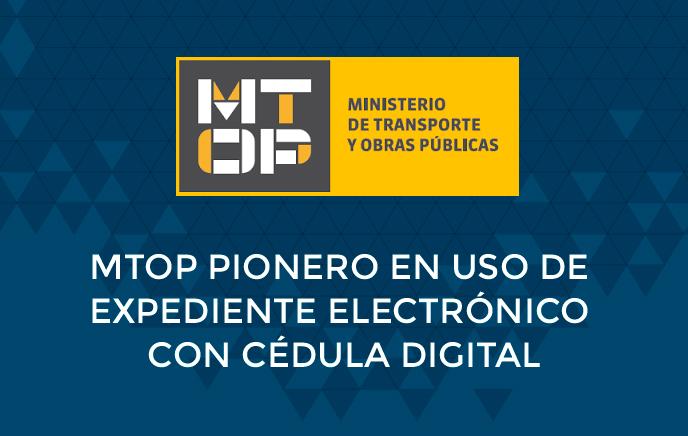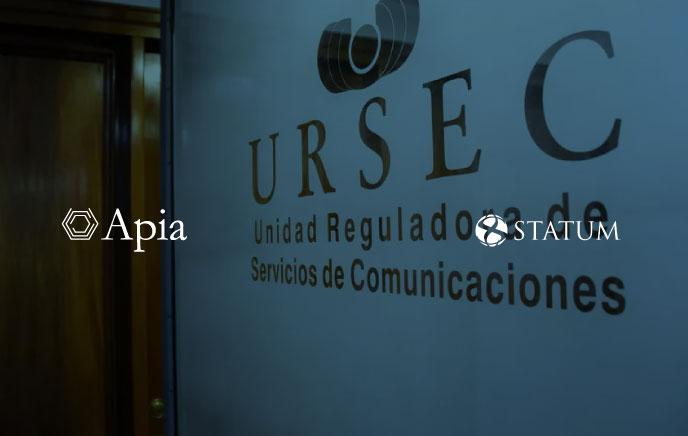MTOP pionero en uso de Expediente Electrónico con Cédula Digital
Resumen:
El Ministerio de Transporte y Obras Públicas (MTOP) se convirtió en la primera institución del Estado en utilizar la cédula de identidad electrónica para la firma de sus expedientes, gracias a la implantación realizada en todos los niveles de su estructura administrativa.
Información:
Una identidad electrónica es la plataforma mediante la cual el sector público identifica, autentifica y firma electrónicamente, empleando claves concertadas y abiertas a la utilización por parte de todas las dependencias públicas.
La identificación electrónica garantiza la identidad fehaciente del individuo en el mundo digital y, en este caso, se adicionan nuevas garantías como el guardado permanente del documento y la imposibilidad de falsificación. No obstante, la ventaja más trascendente es que no se requiere la presencia física de una persona para que interactúe virtualmente.
La mejora en la operativa abarca también nuevos servicios de valor agregado a la ciudadanía, como la realización de trámites en línea. Si bien la cédula de identidad electrónica se implementó en mayo del 2015, gracias al compromiso de AGESIC, actualmente nuestro país cuenta con acciones desarrolladas para establecer un marco legal y de seguridad, y también posee la tecnología necesaria para lograr la cédula de identidad electrónica con firma digital.
La ciudadanía podrá acceder fácilmente a las ventajas del gobierno electrónico, disminuyendo considerablemente los tiempos administrativos y brindando una mayor seguridad en las operaciones electrónicas. Por ende, no solamente estará asegurada la identidad de los interlocutores, sino que además serán posibles las comunicaciones telemáticas, el intercambio de información, el acceso y las acciones en internet.
De esta forma, STATUM sigue avanzando en la senda de los trámites en línea y en la mejora de las actividades del sector público, por lo que se prevé que las gestiones en línea estarán plenamente operativas en este 2016, como parte del proyecto de Gobierno Electrónico que ha desarrollado AGESIC.
El Ministerio de Transporte y Obras Públicas (MTOP) se convirtió en la primera institución del Estado en utilizar la cédula de identidad electrónica para la firma de sus expedientes, gracias a la implantación realizada en todos los niveles de su estructura administrativa.
Información:
Una identidad electrónica es la plataforma mediante la cual el sector público identifica, autentifica y firma electrónicamente, empleando claves concertadas y abiertas a la utilización por parte de todas las dependencias públicas.
La identificación electrónica garantiza la identidad fehaciente del individuo en el mundo digital y, en este caso, se adicionan nuevas garantías como el guardado permanente del documento y la imposibilidad de falsificación. No obstante, la ventaja más trascendente es que no se requiere la presencia física de una persona para que interactúe virtualmente.
La mejora en la operativa abarca también nuevos servicios de valor agregado a la ciudadanía, como la realización de trámites en línea. Si bien la cédula de identidad electrónica se implementó en mayo del 2015, gracias al compromiso de AGESIC, actualmente nuestro país cuenta con acciones desarrolladas para establecer un marco legal y de seguridad, y también posee la tecnología necesaria para lograr la cédula de identidad electrónica con firma digital.
La ciudadanía podrá acceder fácilmente a las ventajas del gobierno electrónico, disminuyendo considerablemente los tiempos administrativos y brindando una mayor seguridad en las operaciones electrónicas. Por ende, no solamente estará asegurada la identidad de los interlocutores, sino que además serán posibles las comunicaciones telemáticas, el intercambio de información, el acceso y las acciones en internet.
De esta forma, STATUM sigue avanzando en la senda de los trámites en línea y en la mejora de las actividades del sector público, por lo que se prevé que las gestiones en línea estarán plenamente operativas en este 2016, como parte del proyecto de Gobierno Electrónico que ha desarrollado AGESIC.





Comentarios (0)
Deja un comentario